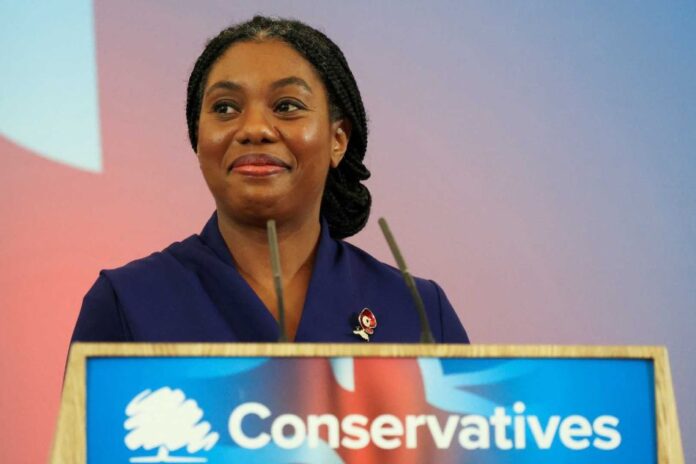Amid growing Conservative Party tensions, immigrant communities react to leadership debates, highlighting the paradox of a Nigerian-born leader criticized for anti-immigrant policies.
In a surprising turn of events, immigrant communities across the UK are openly supporting efforts within the Conservative Party to allegedly replace leader Kemi Badenoch. Senior party figures are reportedly discussing her removal due to internal disagreements, falling public approval, and controversial policy decisions that have alienated key voter groups.
Growing Discontent Among Immigrant Groups
Immigrant leaders and organizations call the potential leadership change a “hopeful moment” for repairing ties between the Conservative Party and minority communities. Dr. Amina Yenusa of the Migrant Forum stated, “Badenoch’s leadership has often treated immigrants as political targets rather than people. Replacing her could signal a new chapter of respect.”
Badenoch, herself the daughter of Nigerian immigrants, has faced backlash for her tough immigration policies, vocal skepticism of multiculturalism, and support for measures critics argue harm minorities. Examples include strict deportation rules and a “British Values” education plan accused of sidelining diverse perspectives. While these stances won praise from right-wing Conservatives, they deepened distrust among urban voters and immigrant populations.
The Political Cost of Polarization
Recent polls show Conservative support among ethnic minority voters has hit a 20-year low, with younger immigrants, a fast-growing demographic, viewing the party as hostile to diversity. Internal party data warns of election losses in critical areas like London and Birmingham if trends continue.
Anonymous Conservative MPs blame Badenoch’s focus on divisive “culture war” issues for worsening the party’s image. “Her agenda ignores urgent problems like housing, education gaps, and inflation,” one MP said. “Without a leadership change, we risk electoral disaster.”
Irony and Frustration in Immigrant Circles
Many immigrants express frustration that Badenoch, who shares their background, has championed policies they see as harmful. Nigerian-British activist Donald Okonkwo remarked, “It’s ironic, a leader who could have uplifted us instead used her position to attack immigrants. That betrayal hurts.”
Badenoch’s Defense and Party Divisions
Despite criticism, Badenoch retains loyal supporters. Right-wing MPs and conservative groups applaud her for resisting “woke ideology” and defending “British identity.” At a recent rally, she vowed to continue pushing her vision of “common-sense conservatism,” dismissing rumors of her exit.
Potential successors like Tom Tugendhat, Penny Mordaunt, and Sajid Javid are seen as moderates who could bridge divides. However, trust remains fragile. “Changing leaders isn’t enough,” warned Yenusa. “The party must prove it values immigrants through actions, not just words.”
What’s Next?
With local elections and a 2026 general election looming, Conservatives face a critical choice: stick with Badenoch’s hardline approach or shift toward inclusivity to regain lost ground. In immigrant neighbourhoods, from London to Leeds, many are cautiously optimistic but demand tangible change. As Fatima Rahman, a Bangladeshi community organizer, put it: “We’re British. We contribute. We deserve respect, not stereotypes.”
The coming months will test whether the Conservative Party can turn this moment of crisis into an opportunity for renewal or risk fading into irrelevance.






